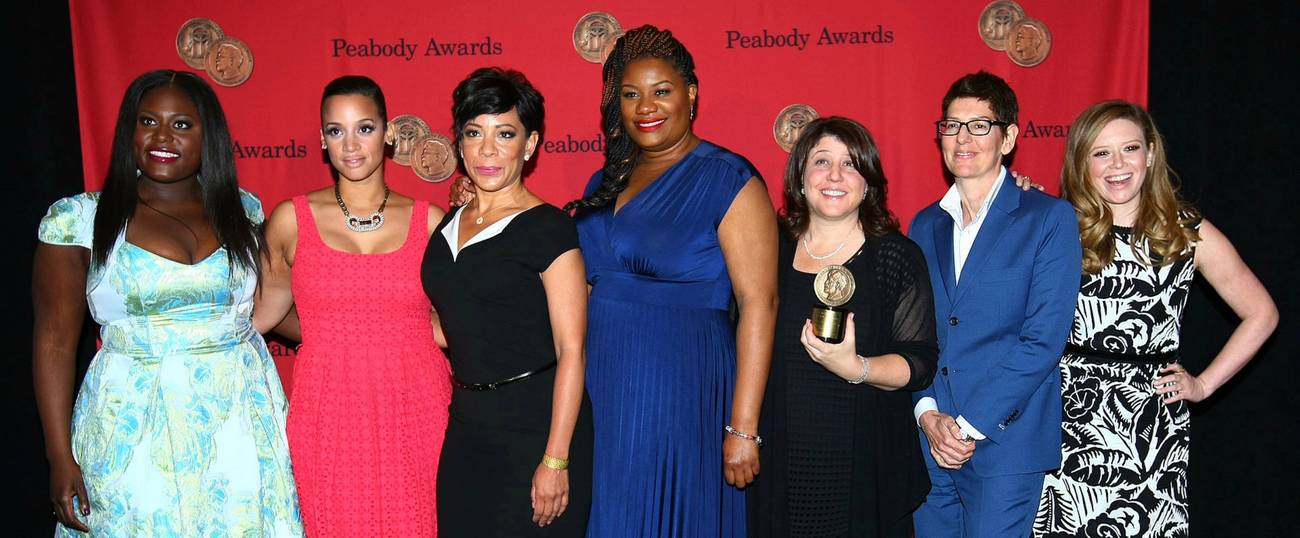Hava Nagila! Jewish Themes Abound in ‘Orange Is the New Black’
The third season of Netflix’s hit series takes on kosher food and conversion




(Note: This article contains spoilers)
The gates to binge-watching heaven opened on June 12 when the entire third season of Orange Is the New Black became available. The show’s most fervent devotees temporarily shunned society as they settled into a favorite TV-watching spot and devoured 13 episodes of the sharply written dramedy.
Orange Is the New Black, one of Netflix’s most popular original series, is based on the true story of Piper Kerman, a Smith College graduate who got caught smuggling drugs for her girlfriend, which landed her in prison for 13 months. OITNB is often lauded for depicting a setting (a women’s prison) that has barely received any airtime, and for introducing a wonderfully diverse set of characters, such as Sister Jane, a “political protesting junkie” nun, and Sophia Burset, a black transgender woman who styles prisoners’ hair.
While Jenji Kohan, the creator of OITNB, has portrayed a gamut of races, ethnicities, and characters with various sexual orientations and gender identities, she has hardly touched on a Jewish theme or character. In the first two seasons, the only Jewish character was Piper’s slightly nebbishy fiancé, Larry Bloom; the only Jewish tropes depicted were Larry’s busybody mother and wealthy liberal father.
It’s interesting that, in the past two seasons, Kohan hasn’t engaged with Jewish themes on a deeper level, especially in light of the fact that she sends her children to a Jewish day school and has Shabbat dinners with her family. But this puzzlement begins to dissipate, when, in Season 3, Kohan suddenly starts to saturate the show with rabbis, Hebrew blessings, and one captivating conversion story.
The Jewishness in this season begins with the crux of all things Jewish: food. The inmates of Litchfield Correctional Facility beg for kosher food once the prison starts to serve precooked bags of flavorless mush. The packaged kosher meals, the inmates quickly discover, is fresher and tastier than the trayf alternative. The promise of crunchy vegetables and richly flavored protein makes dozens of inmates (temporarily) toss their faith in Jesus aside (we’re looking at you Sister Jane) and pretend that they’ve had a Bat Mitzvah or that they’re related to Drake.
But because kosher food is more expensive than the precooked bags of pork, the assistant warden, in the hopes of saving the prison a few dollars, invites Rabbi Teitelbaum to Litchfield to determine who is truly Jewish. In the episode called “Where My Dreidel At,” Rabbi Teitelbaum asks each inmate interested in receiving kosher meals what being Jewish means to them.
The inmates’ answers range from the blandly stereotypical (“I call my mother every day and I love a bargain deal”) to the funny and chutzpadik (“I think you all are doing a wonderful job controlling the media. I mean we. We are doing a wonderful job”). While various inmates try to memorize “Hava Negila” and pronounce their disgust for shrimps (all for the sake of impressing Rabbi Teitelbaum), no one is more passionate about receiving her kosher food than Cindy Hayes.
Cindy is a black woman who is often characterized as cartoonish and perpetually loudmouthed, and in Season 3, she becomes singularly devoted to obtaining kosher meals for the remainder of her incarceration. When asked to explain her Jewish background to Rabbi Teitelbaum, Cindy hilariously recites a monologue from Annie Hall, “The whole family Hayes grew up under the cyclone on Coney Island…” Once she realizes that this fails to impress, she tries to channel the plotline from Yentl. Rabbi Teitelbaum then tells her, “Miss Hayes, while I am heartened that you appreciate the works of Woody Allen and Barbra Streisand, I think you’ve confused cultural Judaism with committed Jewish belief.”
In spite of failing to get on the “Eligible for Kosher Meals” list, Cindy does not give up on those tasty meals. Rather, she plans to pull out the big guns by converting to Judaism. Cindy finds a couple of Jewish inmates, including Shayna Malka Ginsburg (a—surprise!—money laundering criminal) to teach her the various concepts of Judaism.
After several studying sessions with Ginsburg, Cindy asks Rabbi Teitelbaum to visit Litchfield once more. She tells him that she plans to convert. Teitelbaum is, of course, skeptical. How can he be certain that Cindy yearns for more than chicken with a side of crunchy broccoli? OITNB viewers were likely skeptical as well. After all, Cindy has always seemed to be one of the least complex characters on the show. Unlike the other inmates portrayed, she has barely shown a sense of internal conflict or emotional vulnerability. Instead, she simply passes her time at Litchfield by indulging in carefree gossip and attention-grabbing antics.
In the last episode of the season, however, Cindy is poignantly characterized when pressed with questions by the rabbi. Her sincerity in converting is heartfelt when she expounds on her spiritual journey to the rabbi:
Season 3 concludes with the women of Litchfield escaping from the prison grounds (when a few workers stupidly leave a large gap open in the prison fence), and frolicking in a nearby lake. While her fellow inmates relish their sliver of freedom, Cindy submerges her body in the lake three times, recites a blessing, and is lovingly told “Mazel Tov, you’re a Jew” by Ginsburg.
In these final scenes, OITNB and Kohan wisely press pause on the superficial Jewish Hollywood tropes of thrifty shopping, helicopter moms, and Hasidic garb, and instead focus on a tradition that values questions more than they do answers, that submerges itself in the proverbial gray areas of debate and spiritual wrestling. In these thought-provoking ways, Kohan finally allows Judaism to join the ranks of the delightfully diverse crowd that characterizes OITB’s famous Litchfield Prison.
Previous: Actress Laverne Cox: I Like Jewish Guys
Rebecca Mordechai is a middle school English teacher and a freelance journalist.